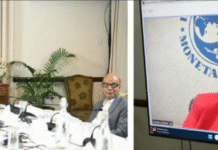Experts attribute it to an unrealistic growth target

The government’s revenue collection in the first half of the current fiscal year fell short of its target by a record Tk58,000 crore, marking a 1% year-on-year decline, mainly due to the July-August mass uprising and its economic aftermath, according to NBR sources.
Experts further attribute the shortfall to the high revenue targets set by the previous government, political instability and slow activity by National Board of Revenue officials in field offices.
Sources at the NBR said revenue collection has picked up slightly since October, with a 6% year-on-year increase in December. However, they anticipate a significant revenue deficit for the current fiscal year.
The International Monetary Fund has been pressuring the government to increase revenue collection, prompting a significant VAT hike on about 100 goods and services on 9 January, aimed at raising an additional Tk12,000 crore.
In the current budget, the government set a Tk4.80 lakh crore revenue target. However, revenue officials have calculated that less than Tk1.58 lakh crore was collected between July and December.
Muhammad Abdul Mazid, a former NBR chairman, told The Business Standard, “The previous government set an unrealistic revenue target, resulting in a Tk58,000 crore shortfall.
“The July-August mass uprising and its aftermath have affected the economy. Business activity slowed, and field-level collection offices became detached, contributing to the shortfall in revenue collection.”
Mazid, who served as NBR chairman in 2007-08 when revenue collection saw the highest growth, said, “There was an opportunity to boost revenue by collecting arrears and targeting tax evaders, but perhaps not enough emphasis was placed on this.”
Sources at the NBR said income tax collection increased by 2.59% over the past six months, with a 0.61% rise in import tax, while value-added tax collection decreased by 5.45%.
The drop in VAT collection is linked to slower business and trade, as well as reduced implementation of government development projects and stagnant investment due to uncertainty.
Ali Ahmed, a former NBR member for the VAT wing, told TBS, “The slowdown in business, the cut in development projects and investment stagnation have led to declining VAT collection.”
Despite a 15% increase in income tax and a 10% rise in import tax in December, VAT collection fell by 6% year-on-year.
Economists suggest that financial support from development partners may boost the economy in the coming months, but a large revenue deficit is still expected. They recommend revising and lowering the revenue target and urging field-level officials to be more active.
tbs









